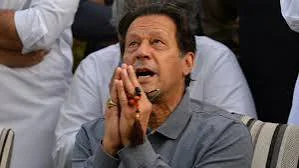Imran Khan Indicted in May 9 GHQ Attack Case
0
December 05, 2024
Imran Khan Indicted in May 9 GHQ Attack Case
In a significant development in Pakistan's ongoing political turmoil, former Prime Minister Imran Khan has been formally indicted in the May 9 General Headquarters (GHQ) attack case. The case pertains to violent protests and attacks on military installations following Khan's arrest earlier this year. This indictment marks a critical moment in Pakistan's political and judicial history, with ramifications for both the country’s democracy and its civil-military relations.
The May 9 Incident
On May 9, 2024, Pakistan witnessed a wave of unprecedented violence as supporters of Khan's Pakistan Tehreek-e-Insaf (PTI) party reacted with outrage to his arrest in a corruption case. The protests escalated into riots, with demonstrators targeting sensitive military installations, including the GHQ in Rawalpindi. Video footage and eyewitness accounts revealed widespread vandalism and arson. The attack on the GHQ, a symbolic nerve center of Pakistan's military, was a direct challenge to the institution’s authority.
The government accused PTI leaders of orchestrating the violence and claimed that Khan’s rhetoric had incited his followers. Following these events, the military vowed to take decisive action against those involved, labeling the attacks as acts of sedition.
Charges Against Imran Khan
Imran Khan faces serious charges, including incitement to violence, sedition, and damaging state property. The prosecution alleges that Khan’s speeches and statements before and after his arrest directly influenced the violent behavior of his supporters. They claim Khan and key PTI leaders planned the unrest as part of a broader strategy to pressure the establishment and regain political leverage.
Khan, who has been in custody for several months, denies the allegations. His legal team argues that the charges are politically motivated and part of a broader crackdown on opposition voices. They claim that Khan’s detention and indictment are attempts to dismantle PTI and remove him from the political arena ahead of upcoming general elections.
Judicial Proceedings
The indictment was announced during a closed-door session of an anti-terrorism court in Rawalpindi. According to court sources, the prosecution presented evidence, including speeches, social media activity, and testimonies linking Khan to the May 9 violence.
Khan's lawyers, however, questioned the credibility of the evidence and criticized the lack of transparency in the proceedings. They argue that the charges are based on selective interpretations of events and do not hold up to legal scrutiny. The court has scheduled the next hearing for later this month, where both sides will present further arguments.
Political Fallout
The indictment of a former prime minister is a rare and controversial event in Pakistan's history. Khan, once a cricket legend and a symbol of hope for millions, has seen his political fortunes dwindle amid accusations of corruption and authoritarian tendencies during his tenure. However, he remains a polarizing figure, with a significant base of loyal supporters who see him as a victim of political vendetta.
Critics argue that Khan's confrontational approach and inability to build consensus during his time in office contributed to his current predicament. His indictment also highlights the deepening divide between civilian and military institutions in Pakistan. The military, traditionally a dominant force in the country’s politics, has been accused of overreach in its handling of the May 9 fallout.
Public Reaction
Reactions to the indictment have been sharply divided. PTI supporters have condemned the charges, calling them an attack on democracy and freedom of expression. They have vowed to continue peaceful protests and challenge the case in higher courts. On the other hand, critics of Khan see the indictment as a long-overdue accountability for his alleged role in destabilizing the country.
International observers have expressed concern over the political climate in Pakistan. Human rights organizations have urged the government to ensure fair and transparent legal proceedings, warning that politically motivated cases could undermine the country’s democratic framework.
What’s Next?
As the case unfolds, its impact on Pakistan’s political landscape remains uncertain. If convicted, Khan could face severe penalties, including disqualification from holding public office. This would significantly alter the dynamics of the upcoming elections and further weaken PTI as a political force.
The May 9 case serves as a litmus test for Pakistan’s judiciary and its commitment to impartiality. It also underscores the urgent need for dialogue and reconciliation in a country increasingly polarized by political and institutional conflicts. The coming months will determine whether Pakistan can navigate this crisis while preserving its fragile democracy.
For now, all eyes remain on the court proceedings, which will undoubtedly shape the future of Pakistan’s politics and governance.
Tags












